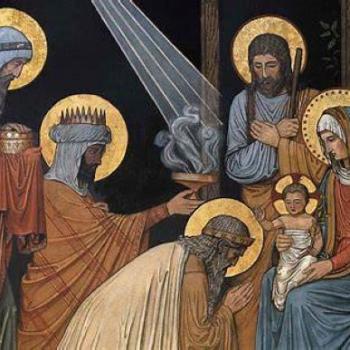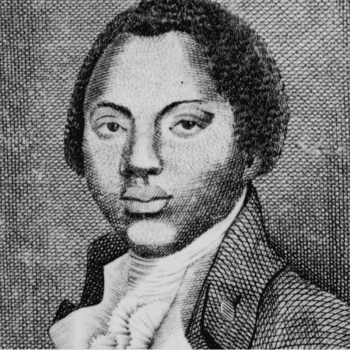But the social climb does not end there, for now Boaz invites her to lunch with him and his men! She is rightly astonished by all this, as should we be, but then Boaz reveals to her and to us that he has heard all about her enormous devotion to Naomi, leaving her country and family to join her mother-in-law in Israel (Ruth 2:11). He prays that "YHWH offer you reward for your deeds, a full reward from YHWH, God of Israel, under whose wings you have come for refuge" (Ruth 2:12). That word "wing" will appear again; do not forget it.
Ruth returns to work after luncheon with the owner, but as soon as she is out of earshot, Boaz orders his workers to allow Ruth to pull grain out of the sheaves already bundled! But if that were not enough, he further orders them to pull some of the grain out of their bundles to insure than Ruth get a truly astonishing glean! And so she does, going home to Naomi with several bushels full of barley grain. If you have not discerned by now that Boaz is getting a decided itch for the amazing Ruth, well, you need a kick-start in your romantic impulse! But though Naomi suggests that Ruth await patiently the certain attentions of the obviously smitten Boaz, six weeks pass. There are no hand-carried cards, no boxes of chocolates, no e-mails, no electronic Jib-Jab funny cards. What has happened to the apparent ardor of the master of the field?
Well, Ruth's gigantic gleanings have impressed Naomi mightily (Ruth 2:20), and she continues and then extends her matchmaker mode. It turns out that her memory has been restored along with her positive state of mind, as she announces that Boaz is a near kinsman, just the thing for a needy woman, or should I say, women, both Ruth and Naomi. So, Naomi concocts a fantastic and dangerous plot to entrap Boaz in matrimony. She urges Ruth to put on her best clothes (her Christian Dior gown?), her best pearls (Cartier?), her finest perfume (Channel?) and head down to the threshing floor where all of the men will be carousing and playing after they have measured and stacked their harvests. Go to the man where he is sleeping, Naomi demands, and then adds, "he will tell you what to do" (Ruth 3:4). So Ruth glams herself up all right, and heads off to the threshing floor, but she does not quite do all that her mother-in-law advises.
She finds Boaz's heap of grain, and its owner sleeping soundly near it, and creeps over to him, uncovers his "feet," and lies down to wait. The fact that "feet" is quite often a euphemism for genitals in Hebrew adds a certain frisson to the tale, making it perhaps PG-13 at least! Boaz is startled awake and demands to know just who this brazen woman may be. "I am Ruth, your companion" (not "servant" as the NRSV wrongly translates), Ruth replies. Now if she stopped there, and waited for Boaz's response, she would have done what Naomi had asked. But this is Ruth! She is the woman who gave her life for her mother-in-law, the woman who risked life and reputation to glean in a field of a man she did not know, the woman who came to the threshing floor at midnight with that same near stranger, risking again life and name. Do you imagine she will now allow Boaz to tell her what to do? She does not! "Spread your cloak over your companion, because you are next of kin!" she demands (Ruth 3:9), and if that is not a wedding proposal, I do not know what it is! Delightfully, Ruth artfully uses Boaz's own word, translated earlier as "wing" (canaph), read here as "cloak," suggesting quite directly that "YHWH's wing" in this instance is in a very human reality Boaz's cloak.
After the shocking discovery that there is still another near kinsman with prior rights to Ruth (3:12), Boaz and Ruth spend the night together on the threshing floor. However, these actions are clearly dangerous ones, since Ruth arises to leave before the sun is up (Ruth 3:14). Boaz assures Ruth that he will not delay, but will settle the matter today with the other man who can claim Ruth as his own. And so he does, in a delightful scene at the court of the gate of the city (Ruth 4:1-6). Once the other man (hilariously called peloni 'almoni, translated as "friend" by the NRSV but appearing to mean rather more like "hey you") has been convinced that marriage to Ruth will only mess up his own inheritance, since any children born to her will be the heirs of her property, leaving "hey you" out in the cold, Boaz is now free to marry Ruth which he quickly does. Just as quickly she is pregnant and gives birth to a child named Obed ("servant"), father of Jesse, father of David, Israel's greatest (if most notorious) king.
But the story is not about this child, nor is it about the love match between Ruth and Boaz, despite any number of lurid covers of biblical novels depicting a full-figured Ruth and a barrel-chested Boaz. This is Ruth's story, and that is made clear by 4:15. The women of the neighborhood bless YHWH for the birth of Obed, but more they remind Naomi what this great story has told us nearly from its beginning. "Your daughter-in-law who loves you, who is more to you than seven Israelite sons, has given him birth" (Ruth 4:15). Now there is a patriarchal mouth full! The only time the word "love" is used in this entire story is here, and it plainly refers to Ruth's undying love for Naomi. And this foreign widow is worth more than "seven sons," the complete number seven suggesting "as many sons as there may be." The powerhouse woman Ruth is beyond compare. In short, it should be concluded that in this magical tale YHWH is nothing less than a Moabite widow!





